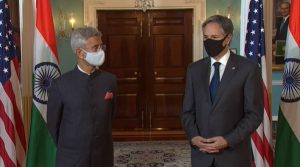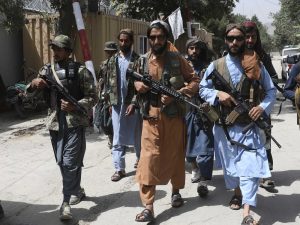
By Shweta Aggarwal
Amid continuing volatility and precarious security situation in the Taliban-ruled Afghanistan, the overarching priority of India will be to ensure safe return of all Indians stranded in the war-torn country.
“At the moment, we are – like everybody else – very carefully following developments in Afghanistan. I think our focus is on ensuring the security, in Afghanistan, and the safe return of Indian nationals who are there,” India’s External Affairs Minister S. Jaishankar told journalists on the sidelines of a UN event in New York.
“So, that is really what has been very much the focus of my own engagements here, talking to the UN secretary-general, to other colleagues who are here, as well as with the US secretary of state a few days ago,” he added.
“First of all, while you used the word investment, for us, it reflected what was a historical relationship with the Afghan people. I think that relationship with the Afghan people, obviously, continues and that will guide our approach to Afghanistan in the coming days,” said Jaishankar when asked if India, which was the largest regional donor in Afghanistan with investments of almost $3 billion, will continue to be engaged with the country.

“As for India, the safety of Indians is of paramount concern to New Delhi and any other consideration; geopolitics or recognition of the new Taliban regime in Kabul comes later. India will be closely watching how the Taliban behaves before taking a call on terms of engagement with the Taliban,” said Manish Chand, Editor-in-Chief, India Writes Network and India and The World magazine while commenting on latest developments.
Mr Jaishankar arrived in the US early this week with his trip almost coinciding with the Taliban takeover of Afghanistan on August 15, making the situation in the country the centrepiece of his discussions in Washington and New York. On day 1 of his visit, the UN Security Council held an emergency meeting on the situation in Afghanistan, the second time in 10 days that the UNSC met under India’s presidency for August to discuss the issue.’
In two separate missions, India managed to evacuate around 200 Indians in special flights with much difficulty that involved using local assets to establish contact with the Taliban for safe passage of Indians. The US, which currently controls the Taliban airport, played a critical role in ensuring safe return of Indians.
Mr Jaishankar’s talks with US Secretary of State Antony Blinken prompted the US to do heavy-lifting in Kabul to facilitate safe return of Indians.
“In days to come, India and the US which earlier had divergence of perception on the Taliban, are likely to intensify their coordination as the Taliban represent a common threat to not only their security but also threatens to negate the vision of an inclusive Afghanistan they advocated,” said Mr Chand, president, Centre for Global India Insights (CGII), a think tank focused on global affairs.
Author Profile
- India Writes Network (www.indiawrites.org) is an emerging think tank and a media-publishing company focused on international affairs & the India Story. Centre for Global India Insights is the research arm of India Writes Network. To subscribe to India and the World, write to editor@indiawrites.org. A venture of TGII Media Private Limited, a leading media, publishing and consultancy company, IWN has carved a niche for balanced and exhaustive reporting and analysis of international affairs. Eminent personalities, politicians, diplomats, authors, strategy gurus and news-makers have contributed to India Writes Network, as also “India and the World,” a magazine focused on global affairs.
Latest entries
 DiplomacyJanuary 5, 2026India walks diplomatic tightrope over US operation in Venezuela
DiplomacyJanuary 5, 2026India walks diplomatic tightrope over US operation in Venezuela India and the WorldNovember 26, 2025G20@20: Africa’s Moment – The Once and Future World Order
India and the WorldNovember 26, 2025G20@20: Africa’s Moment – The Once and Future World Order DiplomacyOctober 4, 2025UNGA Resolution 2758 Must Not Be Distorted, One-China Principle Brooks No Challenge
DiplomacyOctober 4, 2025UNGA Resolution 2758 Must Not Be Distorted, One-China Principle Brooks No Challenge India and the WorldJuly 26, 2025MPs, diplomats laud Operation Sindoor, call for national unity to combat Pakistan-sponsored terror
India and the WorldJuly 26, 2025MPs, diplomats laud Operation Sindoor, call for national unity to combat Pakistan-sponsored terror







